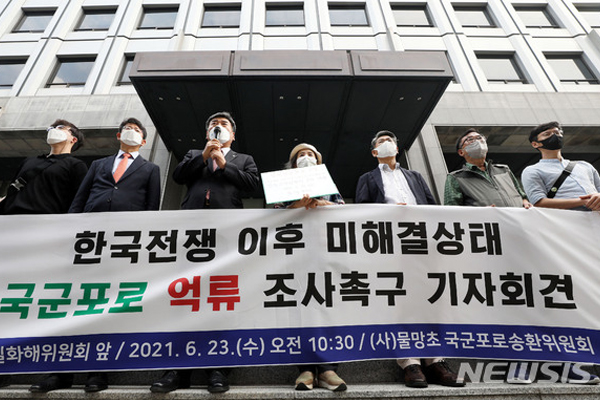June 25 marks the 71st anniversary of the outbreak of the Korean War in 1950, which began when North Korea invaded the South. One of the key issues that has still not been resolved from the war is the issue of South Korean prisoners-of-war (POWs), an issue the Moon administration has repeatedly ignored.
It is estimated that approximately 500 survivors are still being held in North Korea, and they are all in their 80s and 90s. Many human rights activists have called for the Moon Jae-in administration to work toward resolving this issue, but he failed to raise the issue of the POWs with Kim Jong-un in any of their three summits in recent years.
Ahead of the anniversary of the start of the war, depressing news has been reported that the Moon administration held a meeting on the issue of the POWs just once, even though the commission in charge of this issue is required to hold meetings twice a year.
The POWs commission was established in 1999 and it is led by the Vice Minister of Defense. A total of 7 government institutions, including the Ministry of Defense and the Ministry of Unification, participate in the commission. Under the regulations, the commission needs to hold meetings every six months. So, the Moon administration should have held the commission meeting at least 8 times since May 2017, when they came into power. It has been discovered that the commission held its first meeting in July last year and members did not meet in person and just exchanged documents due to COVID-19.
Cho Tae-yong, former First Vice Minister of Foreign Affairs and a current lawmaker from the main opposition People Power Party (PPP), argued that the government has violated its own regulations related to holding meetings on the POWs issue. “It was revealed that the government neglected the POW issue while begging to hold events with North Korea,” Cho said. “It was also discovered that the POW issue cannot be resolved under the current system.”
Cho introduced a bill on June 24 that would establish a presidential commission that will focus on finding out the truth and recovering the honor of the POWs. The commission will be comprised of around 15 members and headed by the prime minister, and will have to complete its study on the POW issue within four years of establishment. The commission will be required to submit a report within six months of the completion of the study to the president and the National Assembly.
“It was discovered that the government lacks organization when dealing with the POW issue,” he said. “In the United States, the Department of Defense operates the Defense POW/MIA Personnel Office that focuses heavily on the POW issue, but there is no such organization in South Korea. We learned that only two people in the South Korean Ministry of Defense oversee the POW issue.”
When asked about the lack of POW commission meetings, Boo Seung-chan, a spokesperson of the Ministry of Defense, stated, “Meetings can be held or not held based on the agenda and it is something that is not mandatory.” He added, “The ministry is doing its best to fundamentally solve this problem in a humanitarian way while keeping in mind that it is the nation’s duty to do so.”
Controversy over whether the Moon Jae-in administration is neglecting the POW issue has been ceaseless during his four years in office. The United Nations Human Rights Council adopted a resolution in March condemning human rights violations in North Korea. However, the South Korean government declined to co-sponsor the resolution for the third year in a row. The resolution for the first time also mentioned the continued violations that affect the rights of the unrepatriated POWs and their descendants.
More recently, Chung Keun-sik, commissioner of the government’s Truth and Reconciliation Commission, faced a strong public backlash and had to apologize to a former POW.
The former POW, who Chung made an apology to, was Kim Sung-tae, an 89-year-old man who escaped from North Korea in 2001 after he was taken by the North during the first week of the war in 1950. He made four failed attempts before successfully escaping. He was tortured and spent time in forced labor camps. “When I first came to South Korea, I was really surprised to see how people were raising dogs as pets,” Kim once said. “I am extremely fortunate to have returned to South Korea after living a life worse than a pet dog up there, but at the same time, I am sad that there are still many POWs left in the North.”
Kim met with Chung on May 24 and handed him his petition asking the commission to find the truth about North Korea and China’s cruel treatment toward POWs during the Korean War. At that time, Chung said, “I am interested in how Chinese POWs were held in a camp located in Geoje Island [located in the South].” After this was reported, people began criticizing Chung for mentioning the human rights of perpetrators while a victim was asking for help.
Chung visited Kim’s house on June 3 and apologized for his comments. After the meeting, Chung told the media that, “What I said was that I had interests in the Chinese POW issue while I was working as a professor at Seoul National University. I am also very interested in the South Korean POWs issue.”
In 2013, the United Nations’ Commission of Inquiry on Human Rights in the Democratic People’s Republic of Korea concluded that at least 50,000 POWs from South Korea were not repatriated and only 8,343 POWs were returned between April 1953 and January 1954. The fate of many of these South Korean soldiers is still unknown, but it is believed to be dire.


